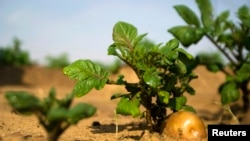Israel is in a desert but manages its water to ensure adequate supplies for agriculture and home use, while many African countries that have enough water lack the ability to get it where it is needed. So residents of African nations have converged on Tel Aviv to learn Israeli techniques of water management.
In Israel's southern desert village of Netiv HaAsara, Ovadia Keidar told African farmers and students about how he has been able to raise flowers and vegetables.
"We use a system which we call drip irrigation system, [in] which we flow water in a pipe underneath the plant," said Keidar, 74. Black pipes with special walls "supply the plant with the water and the nutrients. And the nutrients come by pump through the system, and it comes proportional to the quantity of water that we supply."
Yakov Poleg, director of Israel's Center for International Agricultural Development Cooperation, said his country, though small, narrow and semiarid with most of its land either desert or mountain, has been able to make its small quantity of surface and underground water sufficient for farming.
He said growers were also showing the African visitors how 90 percent of the water used in towns is recycled for irrigation schemes.
"We take them to see the farms," he said. "We want them to get acquainted with the problems of our farmers because, you know, farmers are farmers everywhere and they all have to overcome the same problems everywhere.
"Israel is far from being an optimal country in agricultural production. Half of the country is desert, the other half is hilly, yet we are far sufficient in food, vegetable, poultry. We are number one in the world in meat production. We no longer suffer from water shortages. It's quite fascinating."
Farmer Sylvanus Malungho from Angola said he would use the knowledge gathered in Israel to increase food production in his country, blessed with natural resources but still not able to feed all its citizens.
"We have everything in our country as natural conditions — we have water, we have land," he said. "But the problem is that strategy to do this kind of work — that with 30 grams of seed, you can have 120 tons of tomatoes. This is very good, and we in Africa have to make that kind of partnership."
Only 20 percent of Israel's land area is arable, but the small state of 8 million people is a leading exporter of fresh produce and the most advanced agricultural technologies.




